
AOL is an American web portal and online service provider based in New York City, and a brand marketed by Yahoo! Inc.
A multi-user dungeon, also known as a multi-user dimension or multi-user domain, is a multiplayer real-time virtual world, usually text-based or storyboarded. MUDs combine elements of role-playing games, hack and slash, player versus player, interactive fiction, and online chat. Players can read or view descriptions of rooms, objects, other players, and non-player characters, and perform actions in the virtual world that are typically also described. Players typically interact with each other and the world by typing commands that resemble a natural language, as well as using a character typically called an avatar.

Netscape Navigator is a discontinued proprietary web browser, and the original browser of the Netscape line, from versions 1 to 4.08, and 9.x. It was the flagship product of the Netscape Communications Corporation and was the dominant web browser in terms of usage share in the 1990s, but by around 2003 its user base had all but disappeared. This was partly because the Netscape Corporation did not sustain Netscape Navigator's technical innovation in the late 1990s.
Netscape Communications Corporation was an American independent computer services company with headquarters in Mountain View, California, and then Dulles, Virginia. Its Netscape web browser was once dominant but lost to Internet Explorer and other competitors in the first browser war, with its market share falling from more than 90 percent in the mid-1990s to less than one percent in 2006. An early Netscape employee, Brendan Eich, created the JavaScript programming language, the most widely used language for client-side scripting of web pages. A founding engineer of Netscape, Lou Montulli, created HTTP cookies. The company also developed SSL which was used for securing online communications before its successor TLS took over.

CompuServe, Inc. was an American Internet company that provided an eponymous online service, the first major commercial one in the world. It opened in 1969 as a timesharing and remote access service marketed to corporations. After a successful 1979 venture selling otherwise under-utilized after-hours time to Radio Shack customers, the system was opened to the public, roughly the same time as The Source.
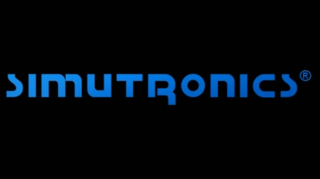
Simutronics is an American online games company whose products include GemStone IV and DragonRealms. It was founded in 1987 by David Whatley, with husband and wife Tom & Susan Zelinski. The company is located in St. Louis, Missouri. It became part of the Stillfront Group in 2016.
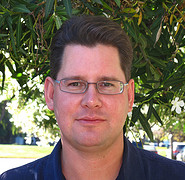
Richard J. Skrenta Jr. is an American computer programmer and Silicon Valley entrepreneur who created the web search engine blekko.
DikuMUD is a multiplayer text-based role-playing game, which is a type of multi-user domain (MUD). It was written in 1990 and 1991 by Sebastian Hammer, Tom Madsen, Katja Nyboe, Michael Seifert, and Hans Henrik Stærfeldt at DIKU —the department of computer science at the University of Copenhagen in Copenhagen, Denmark.
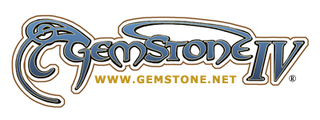
GemStone IV is a multiplayer text-based online role-playing video game produced by Simutronics. Players control characters in a high fantasy game world named "Elanthia". The first playable version of the game was known as GemStone ][ and was launched in April 1988 on GEnie. It was one of the first MMORPGs and is one of the longest running online games still active. Access to the game is subscription-based through its website, with three additional subscriptions levels available, "Premium", "Platinum" and "Shattered", in addition to a free-to-play model introduced in early March 2015.
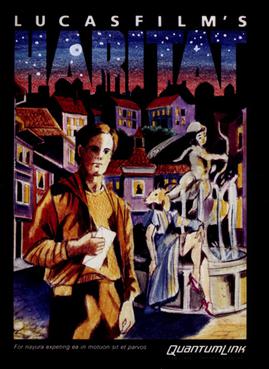
Habitat is a massively multiplayer online role-playing game (MMORPG) developed by LucasArts. It is the first attempt at a large-scale commercial virtual community that was graphic based. Initially created in 1985 by Randy Farmer, Chip Morningstar, Aric Wilmunder and Janet Hunter, the game was made available as a beta test in 1986 by Quantum Link, an online service for the Commodore 64 computer and the corporate progenitor to AOL. Both Farmer and Morningstar were given a First Penguin Award at the 2001 Game Developers Choice Awards for their innovative work on Habitat. As a graphical MUD it is considered a forerunner of modern MMORPGs unlike other online communities of the time. Habitat had a GUI and large user base of consumer-oriented users, and those elements in particular have made Habitat a much-cited project and acknowledged benchmark for the design of today's online communities that incorporate accelerated 3D computer graphics and immersive elements into their environments.
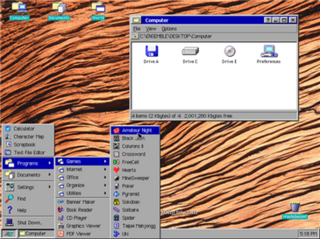
GEOS is a computer operating environment, graphical user interface (GUI), and suite of application software. Originally released as PC/GEOS, it runs on MS-DOS-based, IBM PC compatible computers. Versions for some handheld platforms were also released and licensed to some companies.
DECWAR is a multiplayer computer game first written in 1978 at the University of Texas at Austin for the PDP-10. It was developed from a lesser-known two-player version, WAR, adding multi-terminal support for between one and ten players. WAR and DECWAR are essentially multiplayer versions of the classic Star Trek game, but with added strategic elements. The game was later used, by scrubbing copyright notices and replacing them, as MegaWars on CompuServe and Stellar Warrior on GEnie. Both versions ran for years.
Mark Jacobs is an American game designer, programmer, author and businessman, and the former GM/VP/CEO of Mythic Entertainment, Inc and after Mythic Entertainment was sold to Electronic Arts in 2006 he served as its GM/VP/CEO at EA. Best known as a lead designer of Dark Age of Camelot (2001) and Camelot Unchained (unreleased), he also created two early MUDs, Aradath and Dragon's Gate, serving as both the designer and programmer in addition to his duties as President/CEO. He founded A.U.S.I. in 1983 and worked on a number of computer games for systems such as the Apple II. Jacobs left EA in 2009 after the company decided to merge BioWare with Mythic Entertainment.

Compunet was a United Kingdom-based interactive service provider, catering primarily for the Commodore 64 but later for the Amiga and Atari ST. It was also known by its users as CNet. It ran from 1984 to May 1993.
Dragon's Gate was an interactive, real time, text-based multi user online fantasy role-playing game, sometimes referred to as a MUD. It was one of the longest running pay-for-play online games in the world, it opened to the public in the spring of 1990 on GEnie. In 1996 the game was moved to AOL. Later the game was moved to Mythic Realms, and finally to independent server, where it ran until the summer of 2007.
KansasFest is an annual event for Apple II computer enthusiasts. Previously held every July at Rockhurst University in Kansas City, Missouri, but now held in Springfield, Illinois, KansasFest typically lasts five days and features presentations from Apple II experts and pioneers, as well as games, fun events, after-hours hallway chatter, late-night runs out to movies or restaurants, and more. A number of important new products have been released at KansasFest or developed through collaborations between individuals who likely would not have gotten together. Some of the most notable have been the introduction of the LANceGS Ethernet Card, and the Marinetti TCP/IP stack for the Apple IIGS.
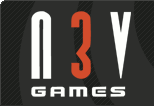
N3V Games is an Australian video game developer and publisher based in Helensvale, Queensland, Australia. Auran is now operated as a holding company, with operations and development ceded to N3V Games, a different closely held company.
The history of massively multiplayer online games spans over thirty years and hundreds of massively multiplayer online games (MMOG) titles. The origin and influence on MMO games stems from MUDs, Dungeons & Dragons (D&D) and earlier social games.
Online games are video games played over a computer network. The evolution of these games parallels the evolution of computers and computer networking, with new technologies improving the essential functionality needed for playing video games on a remote server. Many video games have an online component, allowing players to play against or cooperatively with players across a network around the world.









